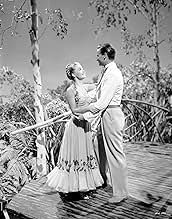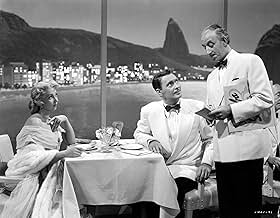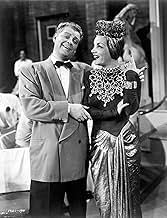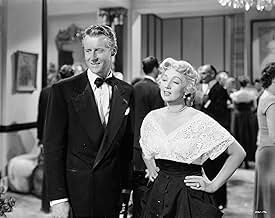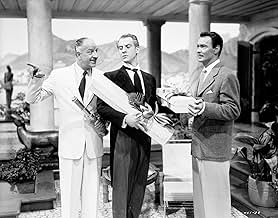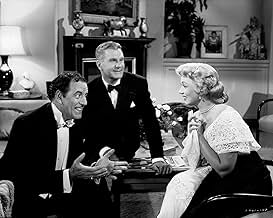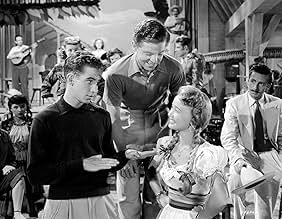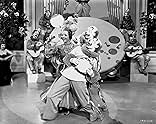NOTE IMDb
6,4/10
661
MA NOTE
Ajouter une intrigue dans votre langueA mother and daughter compete over the same singing role and, unbeknownst to each other, the same man.A mother and daughter compete over the same singing role and, unbeknownst to each other, the same man.A mother and daughter compete over the same singing role and, unbeknownst to each other, the same man.
- Réalisation
- Scénario
- Casting principal
Jean Andren
- Party Guest
- (non crédité)
Carlos Barbe
- South American Man
- (non crédité)
Leon Belasco
- Professor Gama
- (non crédité)
Nita Bieber
- Specialty Dancer
- (non crédité)
Irene Booth
- Party Guest
- (non crédité)
Avis à la une
As a fan of musicals and who gets great enjoyment out of seeing Jane Powell and Carmen Miranda, 'Nancy Goes to Rio' didn't disappoint at all, actually getting more or less what was expected.
Only the story in 'Nancy Goes to Rio' isn't so good. It does go overboard on the silliness and is both thin and too busy at times, with narrative surprises next to none. The ending is also rather abrupt and strange and the romance is bland somewhat and feels like an afterthought.
However, as to be expected, 'Nancy Goes to Rio' is a glorious-looking film. The sets and costumes are suitably opulent and complemented beautifully by the radiant cinematography and the big, bold and rich colours.
The music is always a pleasant listen and infectiously upbeat. "Magic is the Moonlight" and especially "Shine on Harvest Moon" stand out, as does Carmen Miranda's colourful and to-be-seen-to-be-believed second production number. Nice use of "Quando M'En Vo" too from Puccini's 'La Boheme'. The choreography is cleverly done, especially in Miranda's second production number.
Furthermore the script is filled with snappy lines that crackle in energy and wit, the whole film is breezily directed and the whole film is just full of fun and charm, just perfect for 100 minutes escapist entertainment.
Jane Powell is her usual pert and charming self and is in wonderful voice. Ann Southern more than matches her as her mother. Meanwhile Carmen Miranda is a riot in material that shows off her talent splendidly, Louis Culhern is sparkling comedic support and Barry Sullivan is effectively subdued without being bland.
On the whole, a Technicolor and musical treat, as long as you don't demand too much. 8/10 Bethany Cox
Only the story in 'Nancy Goes to Rio' isn't so good. It does go overboard on the silliness and is both thin and too busy at times, with narrative surprises next to none. The ending is also rather abrupt and strange and the romance is bland somewhat and feels like an afterthought.
However, as to be expected, 'Nancy Goes to Rio' is a glorious-looking film. The sets and costumes are suitably opulent and complemented beautifully by the radiant cinematography and the big, bold and rich colours.
The music is always a pleasant listen and infectiously upbeat. "Magic is the Moonlight" and especially "Shine on Harvest Moon" stand out, as does Carmen Miranda's colourful and to-be-seen-to-be-believed second production number. Nice use of "Quando M'En Vo" too from Puccini's 'La Boheme'. The choreography is cleverly done, especially in Miranda's second production number.
Furthermore the script is filled with snappy lines that crackle in energy and wit, the whole film is breezily directed and the whole film is just full of fun and charm, just perfect for 100 minutes escapist entertainment.
Jane Powell is her usual pert and charming self and is in wonderful voice. Ann Southern more than matches her as her mother. Meanwhile Carmen Miranda is a riot in material that shows off her talent splendidly, Louis Culhern is sparkling comedic support and Barry Sullivan is effectively subdued without being bland.
On the whole, a Technicolor and musical treat, as long as you don't demand too much. 8/10 Bethany Cox
Great production values highlight this musical comedy that revolves around a pair of misunderstandings that blossom to full effect.
With her Debbie Reynolds looks and her operatic voice, Jane Powell is wonderful as 17-year-old Nancy Barklay, a budding actress. Her mother, Frances--also an actress--is played by Ann Sothern. The two of them are wonderful together. In fact the entire cast fits together nicely in this light-hearted story that deals with music more than romance. Barry Sullivan plays Paul Berten, the man who sort of comes between them. Louis Calhern is Frances' father, an old song and dance man himself. Carmen Miranda goes full fruit basket with a couple of catchy tunes. Hans Conreid is underused as the family butler.
Technicolor brightens the screen and shows off some great sets, especially the family home in Rio. The wardrobe is striking.
Jane Powell gets to display her classical credentials with a solo from La Boheme.
"Nancy Goes to Rio" is an enjoyable excursion designed to put a smile on the face of viewers. And it does just that.
With her Debbie Reynolds looks and her operatic voice, Jane Powell is wonderful as 17-year-old Nancy Barklay, a budding actress. Her mother, Frances--also an actress--is played by Ann Sothern. The two of them are wonderful together. In fact the entire cast fits together nicely in this light-hearted story that deals with music more than romance. Barry Sullivan plays Paul Berten, the man who sort of comes between them. Louis Calhern is Frances' father, an old song and dance man himself. Carmen Miranda goes full fruit basket with a couple of catchy tunes. Hans Conreid is underused as the family butler.
Technicolor brightens the screen and shows off some great sets, especially the family home in Rio. The wardrobe is striking.
Jane Powell gets to display her classical credentials with a solo from La Boheme.
"Nancy Goes to Rio" is an enjoyable excursion designed to put a smile on the face of viewers. And it does just that.
For practically the whole of Ann Southern's career she was predestined to be considered a competent, reasonably popular actress. In fact, she was considerably more than that and this film, until much later in her career, is the proof. The plot about an actress Mother (Southern) and her singing daughter (Powell) is two steps above hokey but the realization gives it status and sturdy performances in support carry the day. A subplot that has everything thinking the daughter might be with child was semi-shocking for the time but, today, might make one wonder what the fuss was about. The completely artificial looking sets-Rio as painted on a scrim-leave no doubt that this was filmed on the back lot.(And that illusion isn't helped by some included footage actually shot in Rio during Carnival.) But the singing and dancing are fun to watch, Jane Powell is in particularly good voice, and the thin plot just carries the day. But only just. Need I mention the happy ending? Did you think otherwise? So join Ann and the cast for a spurious adventure in Rio and remind yourself what good actors can do with very modest material.
A so-so musical comedy, chipper and competently shot on the studio back lot far, far away from Rio. If there's any reason to watch this corny confection, it would be for the show-stopping number by Carmen Miranda in the nightclub. The hues alone are incredible! Everything is dripping in rich, over-saturated color - the costumes, the set - it's like an explosion at the Technicolor factory. The production designer and director were surely using the process to "wow" the audience used to common, flatter black and white films for so long, similar to the 3D process that would come along later. Inside this gem of a scene is Miranda's dance performance, which is really energetic and quite imaginative. If you ever wanted to test your TV screen color and balance, this scene from this piece of 50s flash might be the one to do that with. The rest of the film? Meh... hokum, but quaint.
Pleasant is a good word for this film. While not one of the top-five musicals, it is well made and enjoyable. Ann Sothern and Jane Powell play mother and daughter who fall for the same man while in South America (No location shoots here. The furthest south anybody working on this movie traveled was probably Long Beach). There are some interesting numbers here, in great part because some of the songs and styles included were rare by the time this movie was made. "Shine On Harvest Moon," an old song, is sung and danced by Sothern, Powell, and amazingly enough, Louis Calhern. "Time and Time Again" is a Nelson Eddy-Jeanette McDonald type number which features Sothern and is probably one of the last of that style to be filmed. The bulk of the musical numbers feature Jane Powell who sings well, as always. Yet, for me, the high point of the film is the number featuring Carmen Miranda. I think it's one of her best. This was Carmen Miranda's next-to-last film and also the last musical for Ann Sothern.
Le saviez-vous
- AnecdotesThis is a remake of the Deanna Durbin film La douce illusion (1940). Both films were produced by Joe Pasternak, and in both the young star --- Jane Powell in this version --- sings "Musetta's Waltz" from Giacomo Puccini's opera "La Boheme."
- GaffesAt dinner Nancy is advised to take calcium to prevent scurvy. Scurvy is caused by a Vitamin C deficiency, not a calcium deficiency, and takes 2-3 months to develop.
- Citations
Paul Berten: He double-crossed me, hit me when I was looking.
- Crédits fousMiss Miranda accompanied by Bando da Lua
- Versions alternativesA whole musical number, "Mention My Name In Sheboygan," performed by Jane Powell and Scotty Beckett, was ultimately cut from the final film. Clips of this scene are still in existence.
- ConnexionsFeatured in That's Entertainment! III (1994)
- Bandes originalesTime and Time Again
Written by Fred Spielman and Earl K. Brent
Performed by Ann Sothern (uncredited) and Danny Scholl (uncredited)
Meilleurs choix
Connectez-vous pour évaluer et suivre la liste de favoris afin de recevoir des recommandations personnalisées
Détails
- Durée1 heure 40 minutes
- Rapport de forme
- 1.37 : 1
Contribuer à cette page
Suggérer une modification ou ajouter du contenu manquant

Lacune principale
By what name was Voyage à Rio (1950) officially released in India in English?
Répondre

